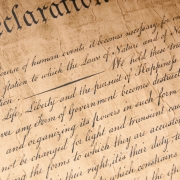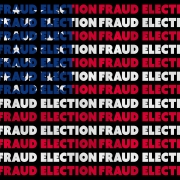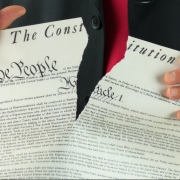It Is Self-Evident That No Person Is By Nature The Ruler Of Other People.
Why does the Declaration of Independence proclaim “We hold these truths to be self-evident” instead of simply stating that “We believe it is true”?
This is actually a good question. Answering it can teach us a lot about the Founding.
When we recall what the world was like in the Founders’ time, the answer becomes clear. The world in those days operated on the basis of utter inequality. Whether the ruler was a king who claimed to rule by divine right or an emperor who claimed the mandate of Heaven, society was essentially the same everywhere, consisting of monarchs and their subjects, rulers and the ruled. This was simply accepted as the way of things.
The Declaration offered the world a new vision. The Founders did not limit themselves to declaring that Americans no longer wanted or needed a king to rule over them. That alone would have been a radical challenge to monarchs everywhere. The Founders went much, much further. They did not merely claim they believed all men, all people, are created equal; they claimed it is self-evidently true that all are created equal. They declared the truth of equality in a world that believed in inequality. America was not simply choosing to opt out of the belief system that sustained monarchs everywhere; the Founders were declaring that the world-system was based on a false belief.
Make no mistake, the Founders understood America’s significance for all humankind. Here is how Thomas Jefferson put it, near the end of his life:
“All eyes are open to or opening to…the palpable truth that the mass of mankind has not been born with saddles on their backs, nor a favored few booted and spurred, ready to ride them legitimately, by the grace of God.”
At the time of the Founding, people everywhere were operating according to the belief that God had put saddles on their backs and rulers in the saddle. Jefferson declared the beginning of the end of the hereditary monarch propped up by an official state religion.
The Declaration’s statement that “We hold these truths to be self-evident” goes to the heart of the teaching mission of the Founders. By stating that these were self-evident truths, the Founders staked out a position far in advance of the way people were thinking in their time. By declaring those truths to be self-evident, they gave the rest of the world the opportunity to realize the truths they were announcing to the world. In the meantime, and until the world caught up with them, they would hold to the truths they were proclaiming.
That is what discoverers do. The American Revolution, like the Copernican Revolution, changed how people everywhere understood the world—but not overnight. A great revolution in thought begins with a few who declare what they have discovered and then stand by the truth of what they have discovered until the world learns to think anew. At first, only a few embraced the idea that the Earth orbited our sun and that the apparent motion of our sun was the result of the Earth’s rotation on its axis. Copernicus published his model in 1543; the Copernican Revolution was not complete until the publication of Isaac Newton’s Principia in 1687, and not accepted by everyone even then.
Just as Copernicus put the belief that our sun orbited the Earth on the road to extinction, the Founders put the world of royals and subjects on the road to extinction. Foreign observers confidently predicted America would fail without a king, but that is not how it turned out. Today, except in a handful of Islamic countries, monarchs are gone or reduced to mere ceremonial figures, made illegitimate by America’s shining example.
Because the Founders’ idea of government by, for, and of the people is so deeply ingrained in our imaginations, it is difficult for us to conceive of human life as it once was. The belief that the person called the king or queen or emperor is the State, and the descendants of that person will be the State in perpetuity strikes us today as odd. In the time of the Founders, the idea that no one was born to rule and no one born to be ruled, was odder still.
Even the people of the thirteen colonies needed help to break free of the idea that they were royal subjects. As Gordon Wood writes in The American Revolution:
“Since the king, in the words of the English jurist William Blackstone, was the ‘pater familias of the nation,’ to be a subject was in fact to be a kind of child…[The people] had to be held together from above, by the power of kings who created trains of dependencies and inequalities, supported by standing armies, strong religious establishments, and a dazzling array of titles, rituals, and ceremonies.”
Tom Paine’s world-changing book Common Sense helped Americans learn to think like citizens instead of subjects. In America, sovereign citizens replaced the royal sovereign. Politics was no longer about the king’s will and the king’s glory, but the well-being of the citizens. Citizens talking to their neighbors, reading newspapers, and considering the proposals of their fellow citizens who were running for political office replaced royals conferring with their courtiers.
As powerful as the old paradigm once was, it is easy for you and for me to see through it today. For us, the Founders’ paradigm seems simply obvious. Here is how Harry Jaffa states it in his book A New Birth of Freedom:
“The queen bee is marked out by nature for her function in the hive. Human queens (or kings) are not so marked. Their rule is conventional, not natural. As we have seen Jefferson say, human beings are not born with saddles on their backs, and others booted and spurred to ride them. These are facts accessible to everyone. They are truths that are self-evident.”
Obvious to us now, and self-evident all along. It is self-evident that no person is by nature the ruler of other people in the way that people are by nature the rulers of their horses and their cattle. It is, as the Founders proclaimed, a self-evident truth.
In the Founders’ day, declaring the self-evident truth that all men are created equal was a rebuke to monarchs everywhere. Today, America’s founding truth is a rebuke to tyrants everywhere, in China, in Iran, and everywhere rulers oppress their people and crush dissent. It is also a rebuke to Americans on the Left who are keen to tear down the system of governance that is the magnificent gift of the Founders—and a reminder that we must follow the Founders’ example in our time by holding to those self-evident truths and resisting those who would return us to the world of rulers and ruled.
Robert Curry serves on the board of directors of the Claremont Institute and is the author of Common Sense Nation: Unlocking the Forgotten Power of the American Idea















